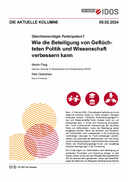
Wie die Beteiligung von Geflüchteten Politik und Wissenschaft verbessern kann
Flaig, Merlin / Abis Getachew (2024)
Die aktuelle Kolumne, 05. Februar 2024
Der aktivere Einbezug von Geflüchteten in der Forschung ist von entscheidender Bedeutung, insbesondere wenn es um ihre Erfahrungen geht. Dies fördert nicht nur einen inklusiveren und ethischeren Ansatz in der Forschung selbst, sondern stellt auch sicher, dass die Erfahrungen und Perspektiven der direkt Betroffenen besser dargestellt werden.